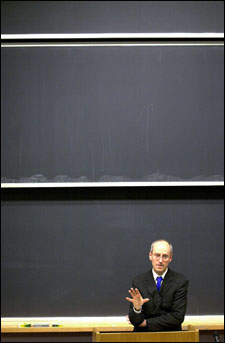Sandel defends human cloning for research:
Cloning and IVF ‘morally indistinguishable,’ professor says

Is there a moral distinction between procedures carried out daily at fertility clinics across the nation and the cloning of human embryos for research purposes? Michael Sandel does not think so.
Sandel, the Anne T. and Robert M. Bass Professor of Government and a member of President Bush’s Council on Biomedical Ethics, gave a talk Monday (Nov. 18) on “The Ethics of Human Cloning.” The lecture was sponsored by the Center for Ethics and the Professions.
In a carefully argued presentation, in which he paused to inscribe key points on the blackboard behind him, Sandel developed the thesis that since there is no discernible moral difference between in vitro fertilization (IVF) and cloning human embryos for research, the latter practice should be permitted, subject to federal regulations.
Sandel and six others on the 17-member President’s Council voted to permit cloning embryos for stem cell research. Another seven voted against it, while three remained undecided and called for a moratorium. Finally, those three sided with the seven who were against cloning and voted to declare a four-year moratorium on cloning for research. Meanwhile, Congress, which is similarly split, has yet to pass a law on the issue.
“If it’s wrong to create and sacrifice embryos for research, why isn’t it wrong to create and discard embryos for fertility treatment?” Sandel asked.
Some commentators have argued that while using “IVF spares” for research purposes should be permissible, deliberately cloning human embryos for the express purpose of extracting their stem cells – a procedure which inevitably results in their death – should be banned. Their distinction is based on the idea that IVF spares would die anyway, so why not use them for a worthwhile purpose? Creating human embryos for research, on the other hand, instrumentalizes them and denies them their due respect.
Sandel made the point that if one looks at the question from the point of view of ends, creating embryos for research is actually more worthwhile than fertility treatments, which result in the destruction of unused embryos.
“Allowing couples to have babies is a good thing, but not as important as curing diseases that afflict hundreds of thousands of human beings.”
Sandel said that the distinction between IVF spares and cloned embryos rests on the doctrine of double effect, or the distinction between foreseeable and intended consequences. According to this doctrine, it would be all right to administer pain medication to a patient even if the medication hastens his death, but not all right to administer the same medication specifically to euthanize him.
“But it’s hard to see the moral difference between a practice that typically sacrifices tens of thousands of embryos and a practice that creates them to be used for research purposes,” Sandel said.
Sandel concluded that morally speaking, “all these practices stand or fall together,” and that the basic issue at stake is “the moral status of the embryo.”
This question, Sandel said, is one that many Americans consider unresolvable, a matter for individual conscience and religious belief, best left out of public debate.
“However, I’ve never been taken with arguments about the limits of public discourse, so why don’t we plunge right in and see what the answer is?”
The question, Sandel said, is whether we consider the embryo a person. And in the case of stem cell research, he pointed out, it must be remembered that the embryos under consideration are only 7 days old, spherical blastulas with no discernible human form.
According to Sandel, the mistake many people make is to consider this question from an either/or perspective.
“The view that the embryo is a person derives support from the Kantian assumption that everything is either a person worthy of respect or a thing open to use. It’s an all-or-nothing ethic that consigns the rest of existence to utility and turns every moral question to a debate over the bounds of personhood.”
But in fact, people’s moral intuitions do not conform to this all-or-nothing view, Sandel said. For example, most people would consider it disrespectful to carve one’s initials in a giant sequoia, although a tree is clearly not a person.
And while some people insist that even a 7-day-old embryo has the same moral status as an adult human being, society’s laws and customs do not support this belief.
“If you think that an embryo is a full human person, then is harvesting stem cells from a 7-day-old embryo as bad as harvesting organs from a baby? If the equal moral status view is correct, then the penalty for harvesting stem cells is inadequate. The scientist who does so should face life in prison or the death penalty.”
Moreover, the fact that people don’t regard the loss of an embryo as equal to the death of a child can be seen by the fact that embryos are not given funeral rites.
Sandel said that while using cloning techniques to create designer babies would be the ultimate hubris, a practice that would “promote the notion that a child is not a gift but a possession,” the use of cloning for research and therapeutic purposes is entirely justified.
“The use of stem cells for biomedical research to find cures for debilitating disease is a way for us to play our part in repairing the given world,” Sandel argued, “Stem cell research should be a blessing for health rather than an episode in the erosion of our human sensibilities.”




